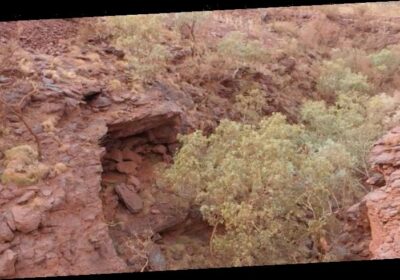‘Another Juukan Gorge’: First Nations leaders warn environment laws risk more destruction

Facebook has banned the sharing or viewing of our news articles on its platform. For independent journalism straight from the source, download our app and sign up to our newsletters.
Necessary protections for Indigenous heritage sites have been excluded from the Morrison government’s proposed environmental reforms, prompting warnings from First Nations leaders it risks another devastating incident like Rio Tinto’s destruction of the Juukan Gorge.
Former competition watchdog Graeme Samuel’s recent review of federal environment law said the government should bring in greater protections for Indigenous heritage “immediately” because of the legal “culture of tokenism and symbolism”.
Before it was destroyed by Rio Tinto, the Juukan Gorge in WA held evidence of human habitation dating back 46,000 years.Credit:PKKP Aboriginal Corporation.
The lack of legal protections for Indigenous heritage sites shot to public attention last year when mining giant Rio Tinto blew up two ancient Aboriginal rock shelters in Western Australia’s Juukan Gorge.
“The longer any substantial reforms take, there is every risk that a site is destroyed or impacted by land users who are not being held to any level of account by the government,” said Anne Dennis, co-chair of the First Nations Heritage Protection Alliance representing 20 key Aboriginal and Torres Strait Island land councils nationwide.
The Samuel Review final report, released in January, said the EPBC Act “heavily prioritises the views of western science, with Indigenous knowledge and views diminished”.
“This reflects an overall culture of tokenism and symbolism, rather than one of genuine inclusion of Indigenous Australians,” Mr Samuel said, as he called for an ongoing review process to update standards over time.
“The National Environmental Standard for Indigenous engagement and participation in decision-making developed by this review should be immediately adopted to deliver initial improvements.”
Environment Minister Sussan Ley has developed a set of standards that do not include Mr Samuel’s recommendations. A bill to establish these standards could be introduced to Parliament as soon as this week.
Ms Ley’s proposed standards are crucial to her bid to swiftly devolve Commonwealth powers to give state governments control over environmental approvals of developments. She told Parliament last week her proposed standards were “interim measures” and the full reforms would be completed in two years’ time.
Ms Ley said on Wednesday that “work on Indigenous heritage protection is already under way”, including consultation with state governments and Indigenous people to modernise the state and federal heritage protection laws.
State and federal governments have their own regulations for cultural heritage, each with significant protections.
Professor Samuel’s far-reaching review requires consultation, which will be conducted with Indigenous representatives, Ms Ley said.
Ms Dennis said the Alliance was “bitterly disappointed” with the Morrison government’s proposed standards, and many significant Indigenous heritage sites were “national treasures” that required nationally consistent protections above state-based laws.
The destruction of the Juukan Gorge rock shelters, which had evidence of continual human occupation tracing back at least 46,000 years, was legally sanctioned under Western Australian state law. But it went against the wishes of the Puutu Kunti Kurrama and Pinikura people, who said they were not made aware of the plans to blast the site until it was too late for the charges to be removed safely.
“Clearly the government’s legislative regime is out of step with community expectations,” Ms Dennis said. “Are they going to be crying crocodile tears yet again when there is another Juukan Gorge?”
Professor Marcia Langton, a descendant of the Yiman and Bidjara Nations, said “negotiated outcomes have been treated with contempt by companies such as Rio Tinto but there are many others”.
“We are fed up with Australian governments failing repeatedly on protecting our cultural heritage,” said Professor Langton, the University of Melbourne’s foundation chair of Australian Indigenous Studies.
Environmental Defenders Officer Western Australia senior solicitor Lauren Butterly said national standards for Indigenous engagement and participation “should be a priority in the government’s first tranche of EPBC Act reforms”.
”The government shouldn’t proceed with its bill without a full response to the Samuel review and a full set of national standards,” Dr Butterly said.
Earlier this year, another Aboriginal heritage site was damaged near WA’s South Flank mine, run by BHP. Representatives from the mining company and the Banjima traditional owners are conducting a joint investigation into what caused a rockfall at the site.
Heritage is also a state issue, but a joint federal parliamentary inquiry launched into the destruction of the Juukan Gorge said the disaster “highlighted the shortcomings of federal law”.
“The Environment Protection and Biodiversity Conservation Act 1999 has proved of limited value in Indigenous heritage protection,” the inquiry found.
Most Viewed in Politics
Source: Read Full Article
